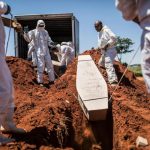 Zimbabwe has to stop illicit financial flows otherwise it will not attain its objective of realising US$12 billion from mining by 2023, Mabvuku-Tafara legislator James Chidakwa told Parliament.
Zimbabwe has to stop illicit financial flows otherwise it will not attain its objective of realising US$12 billion from mining by 2023, Mabvuku-Tafara legislator James Chidakwa told Parliament.
Contributing to the debate on domestic resource mobilisation, which he said was important for empowering local people, Chidakwa said: “Any efforts to realise the US$12 billion mining vision can materialise only if protection mechanisms are there so as to stop illicit financial flows Mr. Speaker Sir.
“Africa and Zimbabwe to be particular, lose taxes, levies and potential revenue because of gaps within our system. These gaps need to be closed through practical implementation at all levels of our governance.”
A report by the Africa Growth Initiative last year said Zimbabwe had lost US$32.2 billion over the past 20 years through illicit financial flows.
Home Affairs Minister Kazembe Kazembe said the country was losing US$100 million a month, translating to US$1.2 billion a year, through gold smuggling alone.
Chidakwa said the country should embrace the comprehensive use of digital tracing and tracking to safeguard its natural resources before they deplete without trace.
Full contribution:
HON. CHIDAKWA: Thank you Mr. Speaker Sir, for this opportunity. I want to thank the mover of this motion because the issue of domestic resource mobilisation is a very important issue, especially when our country is faced with crises. Mr. Speaker Sir, in my view, what is then important or the first thing to do is to inquire what we have in terms of resources as a nation. Mr. Speaker Sir, that will help us to establish the amount of minerals, wildlife and the many natural wonders that we have in our country. To this instance Mr. Speaker Sir, we must ascertain in total the aggregate value of natural resources with which our Zimbabwe is endowed.
Mr. Speaker Sir, I will go further to say we must leverage as well on the nexus between domestic resource mobilisation and devolution. We will do this through empowering local people as defined by Section 264(d) which enunciates and safeguards the rights of communities to manage their own affairs. Mr. Speaker Sir, we then have to utilise these constitutional privileges.
Provincial councils must be capacitated and equipped as per their mandate in increasing sustainable administration of resources at local level. This will then shape our devolution agenda. Also, it will make work easy for any other entity which will be looking at quantifying what we have as a nation. To that effect, local people continue to suffer while the environment within which they live continues to be extracted and degraded as said by Hon. Molokela and Hon. Gabbuza.
Mr. Speaker Sir, what we can recommend is that local people must be incorporated within environmental assessments and also extraction and guarantee their social instruments through social corporate responsibility. This will incentivise them and they will have a sense of ownership. We should also merge resource mobilisation closely with resource management because if we do not do that, we may mobilise but at the end, we will not see the effects because of the leakages that will be happening. So, we will also need to have resource management and resource monitoring working hand-in-glove.
Any efforts to realise the $12 billion mining vision can materialise only if protection mechanisms are there so as to stop illicit financial flows Mr. Speaker Sir. Africa and Zimbabwe to be particular, lose taxes, levies and potential revenue because of gaps within our system. These gaps need to be closed through practical implementation at all levels of our governance.
Mr. Speaker Sir, the comprehensive use of digital tracing and tracking must be embraced and applied now more than ever. We call upon the use of modern technology in safeguarding natural resources before they deplete without trace as we are seeing and reading in social media and our newspapers. To that end Mr. Speaker Sir, we must, at once, introduce artificial intelligence as a tool to enhance transparency but most importantly, improve efficiency in the management of our domestic resources.
Also public resource management reform becomes the core for this House Mr. Speaker Sir in realising the developmental effects of local resources. It is noteworthy Mr. Speaker Sir that every miner, according to Section 251 of the Mines and Minerals Act, Chapter 21:05 is required to submit monthly mineral production and details of mineral disposal or returns to the Ministry of Mines and Mining Development. This compliance is again reiterated as a benchmark to our legal guidance. These requirements must not only be met but seen to be met so as to eliminate incidences of under declaration of quantity and quality of resources that would have been extracted by multi-national companies, local and whoever. These are my submissions Mr. Speaker Sir. I thank you so much.
(108 VIEWS)

